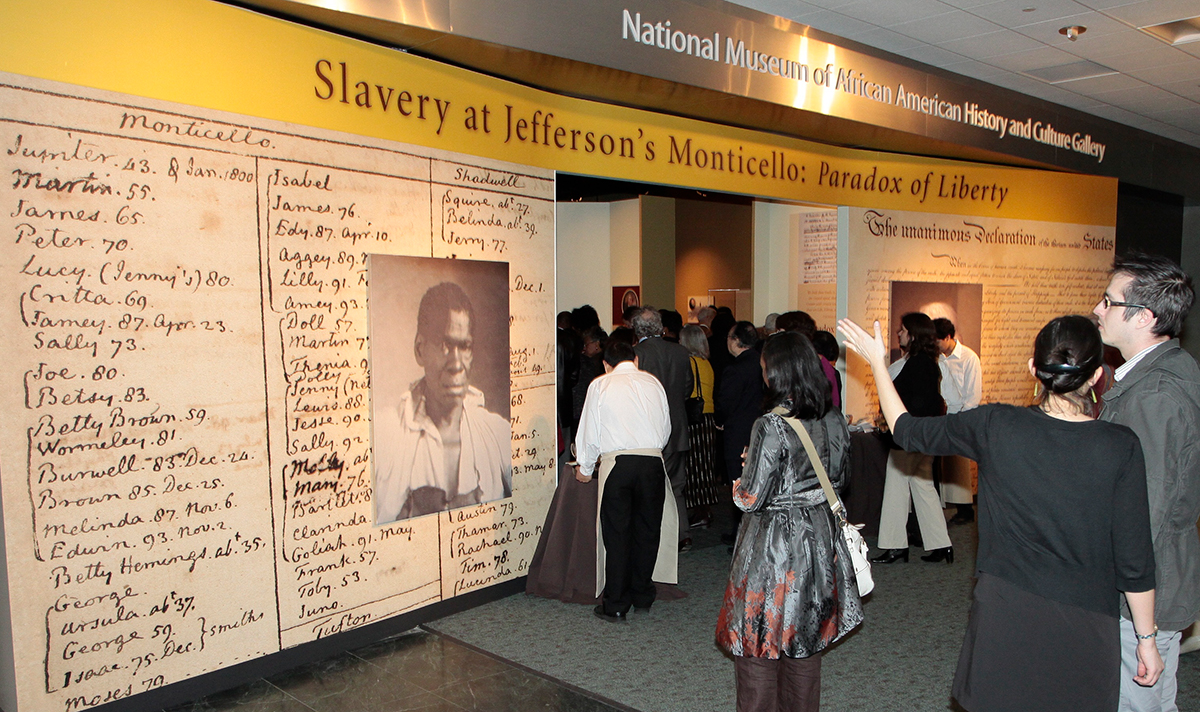FOR IMMEDIATE RELEASE - April 9, 2018
Media Contact: Mia Magruder Dammann, 434-984-7596
CHARLOTTESVILLE, VA – On Monday, April 9, 2018, the National Endowment for the Humanities awarded Thomas Jefferson’s Monticello two major grants, making possible greater accessibility to new archaeological research and a landmark exhibition on the legacy of slavery.

Over the last 30 years, Monticello has received more than a dozen highly competitive, peer-reviewed grants from the NEH, totaling more than $4 million. These grants have supported a range of programs, including archaeology, exhibitions at the David M. Rubenstein Visitor Center, lectures, publications and the restoration of Mulberry Row – the dynamic, industrial hub of the Monticello plantation. These two new grants – combined with a $375,000 NEH Digital Humanities Advancement Grant announced in December – total nearly $1 million in NEH awards to Monticello within the last year.
A $300,000 NEH Public Humanities Project: Exhibitions grant will enable Monticello to update the landmark exhibition Slavery at Jefferson’s Monticello: Paradox of Liberty with new content—including a feature on Sally Hemings—and launch a new national tour to four museums, beginning at the African American Museum of Dallas in September. A “pop-up” version of the exhibition, with special focus on descendant perspectives and journeys, will also travel to libraries and schools. Collectively, the exhibitions are expected to be on view in over 40 locations.
Slavery at Jefferson’s Monticello uses Jefferson’s home and plantation as a lens to explore the paradox of slavery in an age of freedom, and the lives of the enslaved families and their descendants. A second tour of this popular exhibition was inspired both by the availability of new content and by the imperative in the current national moment to discuss how the legacy of slavery continues to shape our nation.
The original exhibition, co-curated by Monticello and the National Museum of African American History and Culture, opened in January 2012 at the Smithsonian’s National Museum of American History. Described as “Groundbreaking” by the Washington Post, it was seen by more than one million visitors in Washington, D.C., Atlanta, St. Louis and Philadelphia.
“During a period of deep divide, with issues of race and equality dominating American headlines, the return of this exhibition could not be more timely,” said Leslie Greene Bowman, president and CEO of the Thomas Jefferson Foundation at Monticello. “NEH grants help Monticello advance research in our field and bring history forward into national dialogues of consequence.”
A $315,000 NEH Humanities Collections and Reference Resources grant was also awarded to the Digital Archaeological Archive of Comparative Slavery at Monticello, known as DAACS, to identify, catalog, digitize and make accessible to diverse stakeholders collections from four of the earliest and most significant 17th-century archaeological sites. The sites are located at Flowerdew Hundred, a thousand-acre plantation on the south side of the James River in Virginia.
To date, DAACS staff and collaborators have systematically cataloged and digitized complete archaeological collections from over 80 excavated sites of slavery in Virginia, Maryland, North Carolina, South Carolina, Tennessee, Mississippi, Barbados, Dominica, Jamaica, Montserrat, Nevis, and St. Kitts.
The grant, entitled The Origins of a Slave Society: Digitizing Flowerdew Hundred will allow scholars, students, descendant communities and the general public access to Flowerdew data and collections via the DAACS website. The grant will also fund internships for students at the University of Virginia from backgrounds traditionally underrepresented in archaeology, anthropology and museum careers.
“The Flowerdew Hundred collections have enormous potential to help students and scholars unravel how indentured Europeans, neighboring Weanock Indians, elite European landowners and enslaved Africans negotiated and adapted to the colonial Chesapeake’s changing natural, social and economic environments,” said Dr. Elizabeth Bollwerk, senior archaeological analyst for DAACS and Co-Director of Digitizing Flowerdew Hundred. “We are delighted to have the opportunity to make collections accessible to the public for the first time.”
“In addition to making archaeological data accessible, the Flowerdew Hundred grant facilitates new opportunities for students of historical archaeology and groundbreaking collaboration between Monticello, the University of Virginia’s Special Collections Library and the Florida Museum of Natural History’s Environmental Archaeology program,” noted Dr. Jillian Galle, project director for DAACS and co-director of the grant.
Including the two grants awarded to Monticello, the NEH announced today a total of $18.6 million in grants to 199 humanities projects nationwide.
###
About The Thomas Jefferson Foundation at Monticello
The Thomas Jefferson Foundation was incorporated in 1923 to preserve Monticello, the home of Thomas Jefferson, in Charlottesville, Virginia. Today, the foundation seeks to share Jefferson’s world, his ideas and the relevance of history with a national and global audience. Monticello is recognized as a National Historic Landmark and a United Nations World Heritage Site. As a private, nonprofit organization, the foundation’s regular operating budget does not receive ongoing government support to fund its twofold mission of preservation and education. About 440,000 people visit Monticello each year. For information, visit Monticello.org.
About the Digital Archaeological Archive of Comparative Slavery
Established by the Thomas Jefferson Foundation in 2000 and based in the department of archaeology at Monticello, DAACS is a web-based initiative providing free access to archaeological data in order to foster inter-site comparative archeological research on slavery. DAACS has received major funding from the Andrew W. Mellon Foundation, the National Endowment for the Humanities, Save America’s Treasures, the National Science Foundation and the Reed Foundation. For information, visit www.daacs.org.
National Endowment for the Humanities
Created in 1965 as an independent federal agency, the National Endowment for the Humanities supports research and learning in history, literature, philosophy, and other areas of the humanities by funding selected, peer-reviewed proposals from around the nation. Additional information about the National Endowment for the Humanities and its grant programs is available at: www.neh.gov
